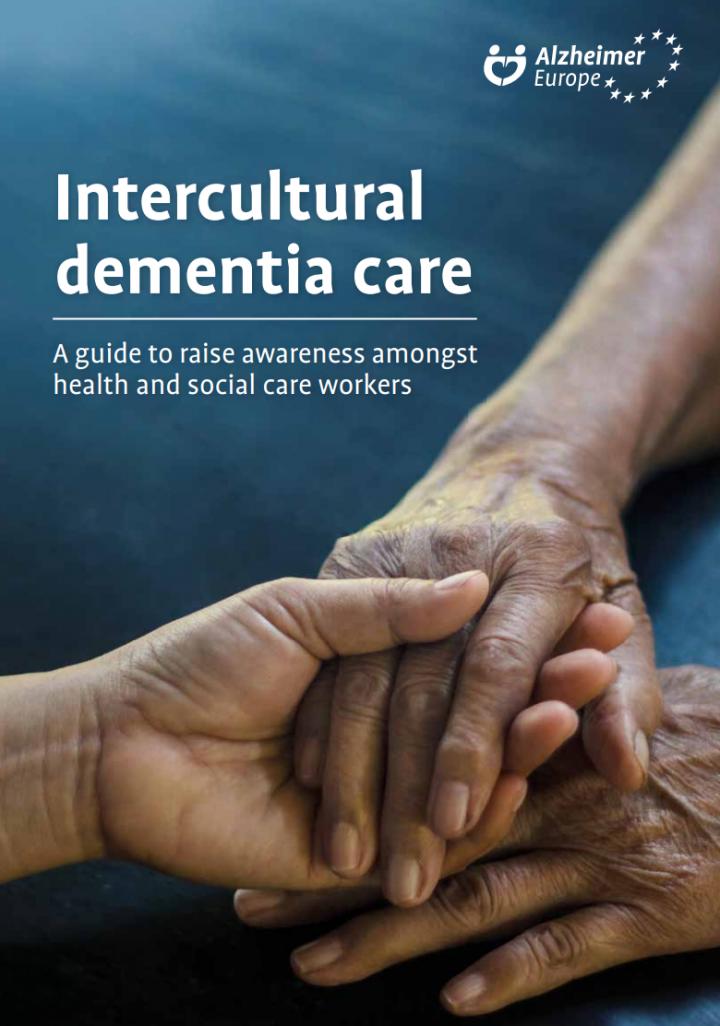
Credit: Alzheimer Europe 2020
Luxembourg, 17 December 2020 – Alzheimer Europe today launched two new publications: “Intercultural dementia care for health and social care providers: a guide” and “Policy briefing on intercultural care and support for people with dementia and their informal carers/supporters”.
The number of people with dementia from minority ethnic groups is increasing as migrant populations in Europe age and some ethnic groups have a higher risk of developing dementia. Although many symptoms of dementia can be managed with good care, the uptake of dementia care services by people from minority ethnic communities remains low.
Alzheimer Europe has responded to this challenge by developing, with a group of experts, a guide to support health and social care workers to provide intercultural dementia care and a policy briefing containing guidelines for policy makers. The association stresses the principle that every person with dementia should be aware of and have access to culturally appropriate dementia care. This work stems from Alzheimer Europe’s 2018 report on “The development of intercultural care and support for people with dementia from minority ethnic groups”.
In its newly-published guide, Alzheimer Europe encourages health and social care workers:
- to provide people from different ethnic communities with culturally appropriate and understandable information about dementia and existing services and support
- to make sure that people understand that dementia is a medical condition and that health and social care systems in Europe offer support and care to people with dementia and their families
- to explore the kind of support or services that would be helpful, adapt existing support if necessary and develop new innovative approaches that reflect the needs and wishes of people from different ethnic communities
- to develop cultural awareness, sensitivity and competence through an ongoing process of learning and exchange between and amongst health and social care workers and people from minority ethnic groups.
Alzheimer Europe further calls for health and social care workers to recognise that every person with dementia is unique. Although people with dementia may share some characteristics with other people from a particular ethnic group, it is important not to lose sight of the individual. Awareness and acceptance of cultural differences should not overshadow recognition of the many things that people from all ethnic groups have in common. It can and should provide a solid basis from which to explore the needs and wishes of each person.
Intercultural dementia care necessitates support at all levels. In the Policy Briefing, which contains extensive recommendations, the association calls on governments to address structural and interpersonal discrimination against people from minority ethnic groups by raising cultural awareness, sensitivity and competences across the whole health and social care system, and to address inequity inherent in policies, practices and procedures. Making a commitment to and investing in intercultural care and support are key steps towards ensuring a just society, one in which people with dementia and their carers, regardless of their cultural backgrounds, can live well and flourish.
###
Alzheimer Europe would like to thank the members of the ethics working group, namely Dianne Gove (Chair), Jean Georges, Owen Miller, Sahdia Parveen, T. Rune Nielsen, Charlotta Plejert, Daphna Golan-Shemesh, Debi Lahav, Michal Herz, Siiri Jaakson, Mohammed Akhlak Rauf, Ripaljeet Kaur, Carolien Smits, René Thyrian, and Jessica Monsees.
The guide is currently available in English, French and German, and will soon be available in Italian and Bulgarian. The policy briefing is available in English. These documents, as well as the initial report, can be freely downloaded from the Alzheimer Europe website:
Guide PDF: https:/
Guide online view: https:/
Policy Briefing PDF: https:/
Policy Briefing online view: https:/
Notes for editors:
The 2020 guide “Intercultural dementia care for health and social care providers: a guide” and policy briefing “Policy briefing on intercultural care and support for people with dementia and their informal carers/supporters” were developed and translated with support from the Robert Bosch Stiftung.
The 2018 report “The development of intercultural care and support for people with dementia from minority ethnic groups” received support under an operating grant from the European Union’s Health Programme (2014-2020) and from the Robert Bosch Stiftung.
For further information about these documents, please contact Dr Dianne Gove, Director for Projects: [email protected]
Media Contact
Dr Dianne Gove
[email protected]




